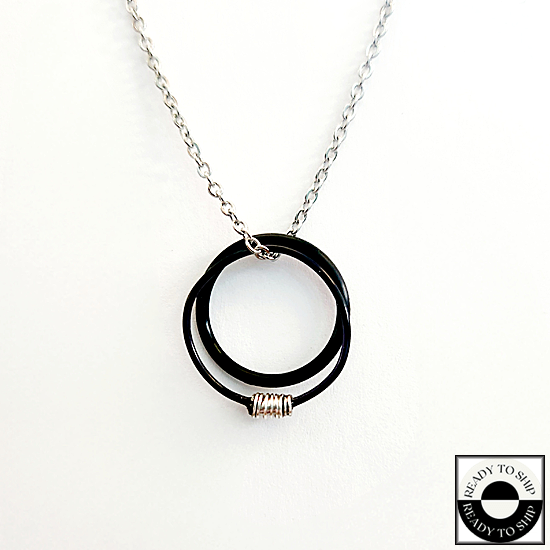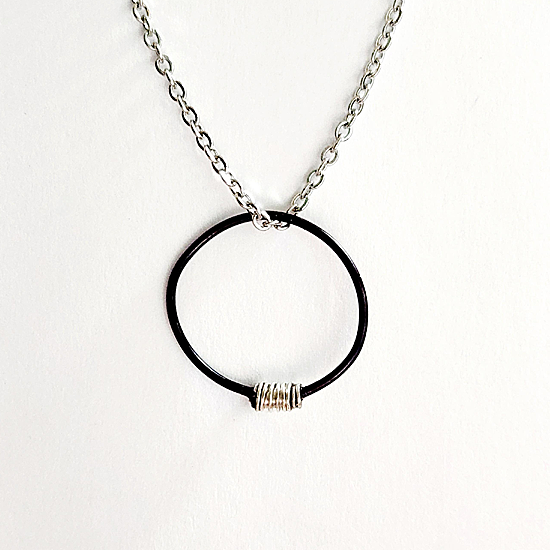Description
Full Circle Series – Artist’s Statement
Lots of people have moments when they say, “it’s come full circle.”
That is what inspired me to do the “Full Circle Series.”
“The literary or philosophical meaning of life coming full circle often means completing a cycle and a return to the beginnings of something. Like a closure to something.”
As I fast approach a milestone at the end of this year, entering my seventh decade, knowing I still have a lot of famous musician’s strings, I do not want to have these left when the time runs out. What do I mean by that, being a jeweler takes its toll on your body and there will be a time when I will no longer be able to do my craft. So, I am making “circles” and they will be very affordable. You will be able to own a piece of “Musical History” should you choose to do so.
When you wear your pendant, you can think of one of your “full circle moments” and feel joy.
ONE AVAILABLE! READY TO SHIP Willie Nelson (3) floating pendant made out of Willie’s used/played black colored guitar string. Designed by 2x breast cancer survivor Elisa Guida, the pendant is app. 15/16″ and includes sterling silver wrapped wire and comes with a rubber disc also app. 13/16″. The pendant includes a 16, 18 or 20″ stainless steel chain. As noted in the description – FCS Pendant is Ready to Ship and will leave my studio in 7 – 10 days. Make sure to view the pictures of the pendant in the gallery.
Musician’s Release Form:

Click To View Form

Willie Nelson is an American country singer-songwriter, actor and activist. He reached his greatest fame during the outlaw country movement of the 1970s, and remains iconic, especially in American popular culture.
Willie Nelson continues to tour and has performed in concerts and fundraisers with other major musicians, including Bob Dylan and Neil Young. Born on April 30, 1933, in Abbott, Texas. During his extensive career, Willie Nelson has written more than 2,500 songs and has released close to 300 albums. He is recognized worldwide as an American troubadour and icon, transcended musical genres, and has remained relevant through five decades through his music, his acting, and as the face of such social causes as Farm Aid, development of biodiesel, and the legalization of Hemp.
The son of Myrle and Ira D. Nelson, Willie Nelson and his older sister Bobbie were raised by their paternal grandparents during The Great Depression. With their grandmother, Willie and Bobbie attended their town’s small Methodist church where they were first exposed to music. “The first music we learned was from the hymnbooks. Willie had such a beautiful voice,” his sister Bobbie told Texas Monthly in 2008. Both grandparents loved music and encouraged Willie and his sister to play. Nelson’s famous gospel song “Family Bible” reflects the influence of his musical beginnings. He sold the song for $50 to his guitar teacher. Nelson got his first guitar at the early age of six and soon started writing his own songs. A few years later, he played his first professional gig with a local polka band. Nelson later joined Bud Fletcher and the Texans and played the local club circuit. Also in the group was his sister Bobbie, who played piano. She later married Bud Fletcher. One of his early inspirations was Bob Wills and His Texas Playboys—a group known for their upbeat country dance music, which included some elements of swing.
After graduating high school in 1950, Nelson went into the U.S. Air Force. He did not last long, however. Stationed in Lackland in San Antonio, Texas, Nelson had to leave the service because of back problems. He tried college, attending Baylor University for a time. To make ends meet, Nelson took on odd jobs, including selling encyclopedias door to door.
Dropping out, Nelson worked as a radio disc jockey for several years and played gigs in his spare time. He continued writing songs, producing some of his most famous works—including “Night Life,” “Crazy,” and “Funny How Time Slips Away”—in the late 1950s.
In 1960, Nelson moved to the country music capital: Nashville, Tennessee. He got a job as a songwriter for Pamper Music, earning about $50 a week. The next year, two of Nelson’s songs become hits for other artists—Faron Young’s version of “Hello Walls” and Patsy Cline’s legendary rendition of “Crazy.” His first album was released the next year without generating much notice.
Singer Ray Price, with whom Nelson had played with previously, made Nelson’s song “Night Life” a big hit in 1963. It seemed that his songs were only successful when they were sung by other people. With his gritty, roadhouse sound, Nelson did not fit into the traditional Nashville country music scene. Producers tried to make him fit the more classic country mould, but they just stripped away his unique style, such as his unusual manner of phrasing. And his resistance to these efforts made him a bit of an outlaw, as did his reputation as a hard-drinking, hard-living man.
His home in Ridgetop, Tennessee, burnt down in 1970. Taking this as a sign, Nelson moved away from Nashville, returning to his native state of Texas. He became part of the country music scene in Austin and started hosting his now legendary Fourth of July picnics. Inspired by Woodstock, the gatherings became popular musical celebrations, and included performances from other country music outlaws such as Kris Kristofferson and Waylon Jennings.
Nelson also kept recording albums, but now he was definitely going his own way. Soon the long haired, bandana-wearing guitarist started to develop a following. Shotgun Willie (1973) is considered to be one of his greatest albums of all time, and showcased his abilities as a singer, storyteller, and performer. The next year, Nelson released Phases and Stages (1974), which became another popular album for the rising star.
With his album, Red Headed Stranger (1975), Nelson had his first taste of crossover success. It did well on both the country and rock charts and featured the hit “Blue Eyes Crying in the Rain,” which was written by Fred Rose. Along with being his first song to reach No. 1 on the country charts, the song also brought Nelson his first Grammy Award for Best Country Vocal Performance in 1975.
Around this time, he contributed to the compilation Wanted: The Outlaws, which also featured Waylon Jennings, Jessi Colter, and Tompall Glaser. Nelson and Jennings also collaborated on the popular song “Mamas Don’t Let Your Babies Grow Up To Be Cowboys,” which won the 1978 Grammy Award for Best Country Vocal Performance by a Duo or Group.
Always interested in different music styles, Nelson recorded his own takes on some American standards on his album Stardust (1978). His cover of Hoagy Carmichael and Stuart Gorrell’s “Georgia on My Mind” earned him his second Grammy Award for Best Country Vocal Performance. Beyond its critical success, the album proved to have staying power as well, lingering on the country charts for a decade.
Website: http://www.willienelson.com/









